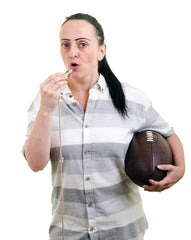Why are there not more female referees in rugby?

It is widely known that Rugby is not such a male-dominated sport as football , therefore it is disappointing that there still remains a distinct lack of top-flight female referees within the sport.
In 2015, Sarah Cox made history when she became the first female rugby referee to join the RFU match official team, and there are other successful women referees out there such as Clare Hodnett and Australian referee Amy Perrett, who are currently carving the way for other female referees, and making it hopeful that before long things will change.
But if we consider the here and now, Rugby continues to lack female referees. Below, Centurion takes a look at why this might be the case.
Prejudice
Rugby is renowned for being a much friendlier sport than football and openly welcoming to female players, but this doesn't discount from the prejudice some female rugby referees may encounter. Claire Hodnett, a 34 year old solicitor from Newark who has refereed men's matches at Championship level was asked whether she encountered sexist attitudes on her journey to the top. Her response was the following: "Oh no, you just wouldn't get that in rugby," she insists, "because regardless of what people think of you as a person or as a referee the sport is a respectful sport and incidents of that kind are very few and far between."
As a successful lawyer, Hodnett had the confidence to persevere in the sport where others might have chosen not to. Amy Perrett, for example, nearly threw the towel in at just 18 due to sexual abuse she received on the sidelines, but after a period of time off and re-evaluation, plus some help from her Mum and former mentor Dick Byres, Perrett was able to commit to what has become a ground-breaking career.
Career
The job of a rugby referee is not a full time occupation, so naturally most of the females who choose to referee will be holding down a full-time job as well. Juggling two careers can be challenging for any person. Claire Hodnett certainly agrees that being a solicitor by day and refereeing rugby matches at weekends and on evenings can be a "treacherous position" to be in. Hodnett recounts how she once had to appear at Nottingham crown court sporting a black eye, "It wasn't ideal when I was appearing before a high court judge," she recalls.
Stamina
Women who commit to being a female rugby referee have to transform themselves physically in order to meet the rigorous standards set by the RFU match officials panel. Hodnett, said; "The hardest part of the journey was meeting the refereeing criteria, in particular the RFU's fitness test. "Whatever way you look at it women are made up differently to men... Men, generally, are naturally quicker than women. That is the bottom line." At the highest level the rugby game is fast and the referee must be as quick and as fit as the players on the pitch. Although there are some excellent women refs already, there is the constant challenge for women to make the fitness and pace.
Progression
Once it has been established and recognised that a female referee is good enough to go all the way to the top, there remains confusion as to whether women face the challenge of the system more greatly than men. Is it as easy for a woman to actually get into the system in the first place? And then when she gets in, will she progress through the system as quickly as a male? Does the system currently market itself equally towards men and women? Perhaps it doesn't and this may be why women are not taking up the positions of referees as readily as men.
Fear
Women's reluctance to referee in rugby could stem from the fear of causing injury to themselves. In general, it is widely recognised that many men are considerably stronger than women and are therefore far likely to cause damage to a female referee upon physical impact. For example, if a female referee is accidentally blind-sided or is called upon to break up a fight between fully grown men in peak condition weighing 15-20 stone, then the consequences are always going to be more dangerous.
Ignorance
There may be many women who have simply not been given the opportunity to practice rugby in their lives. Amy Perrett, the first female to referee a Super Rugby match this summer and an officiator for Rugby Sevens at the Olympic Games in Rio, has been involved in rugby all her life. She grew up with a twin brother and two older brothers and was literally "chucked" in the field by her mum at just 7 years old when a team was short of players. She played until she was 12, but then there were, "no more girls' teams". At present the RFU and other rugby organisations across the world are lending great support to women who wish to get involved, and they are trying to "stamp out" any prejudices which come with the traditional game. Perrett adds:
"There are so many opportunities for women out there at the moment... Female participation is on the rise and it's just a great experience to have and something you'll always remember and look back on."


